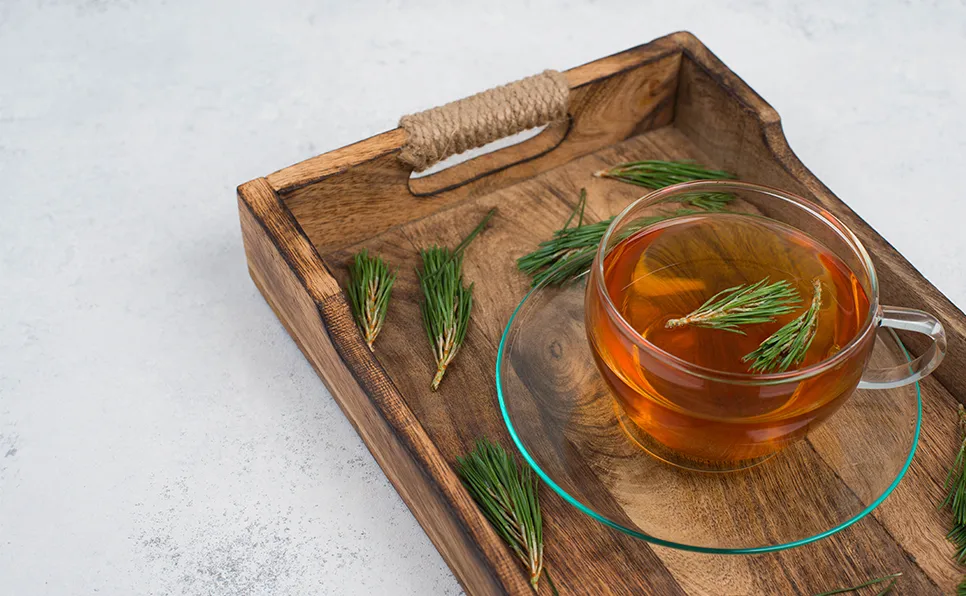Introduction
Who doesn’t like a hot cup of tea in the morning or at the end of a long day at work? Have you ever considered changing your taste for tea to a better habit of choosing health-beneficial ones while it still remains your favorite beverage?
Everyone appreciates going on walks in areas with fresh air, and to see pine trees all around you with their lemony scent and the ground covered in soft, spongy needles is the icing on the cake. Also, have you ever heard of pine needle tea? Well, in addition to appreciating the beautiful trees outdoors, have you ever thought that you can actually bring pine needles to your use to make a delightful and nourishing tea? Let’s learn more.
What Is a Pine Needle Tea?
The needles of specific pine trees are used to make the tea known as “pine needle tea.” In various cultures, it has been used as a traditional treatment and is said to provide several health advantages, including enhancing the immune system, lowering inflammation, and enhancing lung health. Tea made from pine needles has a flavor that is a little bit bitter and a crisp pine fragrance.
Fresh pine needles from a non-toxic type of pine tree are required to create pine needle tea. Scots Pine (Pinus sylvestris) and Pinus Densiflora (Japanese red pine) are two typical species used to manufacture pine needle tea. Before usage, the needles need to be cleaned and dried. You may use either fresh or dried needles to prepare the tea. To make the tea, you can either use fresh or dried needles. If using fresh needles, steep a small handful of needles in hot water for about 5-10 minutes. If using dried needles, steep about 1 teaspoon of needles per cup of water for about 5-10 minutes. Strain the tea and add honey or lemon to taste if desired.
Why Has Pine Needle Tea Gained So Much Popularity?
Some possible factors for pine needle tea gaining so much popularity could include:
- Traditional uses: Pine needle tea has a long history of use in traditional medicine in some cultures, and it may have gained popularity due to its reputation as a natural remedy for various health conditions.
- Health benefits: Pine needle tea is believed to have several health benefits, including boosting the immune system, reducing inflammation, and improving respiratory health. These potential benefits may have contributed to the popularity of the tea.
- Unique flavor: Pine needle tea has a unique, piney flavor that may be appealing to some people.
- Natural appeal: Many people may be drawn to pine needle tea because it is made from a natural source and does not contain any artificial additives or preservatives.
Health Benefits of Drinking Pine Needle Tea
Pine needle tea is made from the needles of certain pine trees and is a traditional remedy in some cultures. It is believed to have several health benefits, including:
- Boosting the immune system: Pine needles include vitamins A and C, which are necessary for a variety of body processes, such as the generation of red blood cells, the growth of hair and nails, and the maintenance of a strong immune system.
- Reducing inflammation: Pine needles contain anti-inflammatory compounds that may help reduce inflammation in the body.
- Improving respiratory health: Some people claim that pine needle tea can help to clear congestion and improve respiratory function.
- Reducing stress: Pine needle tea has a refreshing, piney aroma that may help to reduce stress and promote relaxation. Many individuals believe that the aroma of pine needles alone is uplifting and joyful.
- Supporting heart health: Pine needles contain antioxidants that may help to lower blood pressure and improve cholesterol levels, which may support heart health.
- Weight Maintenance: Pine needles have an anti-obesity impact, according to recent studies.
Wrapping It Up
Although pine trees are often associated with the winter, their leaves are extremely valuable all year long. Pine needles have a powerful punch, whether you’re seeking for an energizing aroma or an antioxidant-rich tea!
However, it’s important to note that pine needle tea can be toxic if made from certain types of pine trees, such as the yew tree. If you are considering trying pine needle tea, it is important to make sure that you are using needles from a safe species of pine tree. It is also important to talk to a healthcare professional before adding pine needle tea to your diet, as it may interact with certain medications or have other potential risks.



